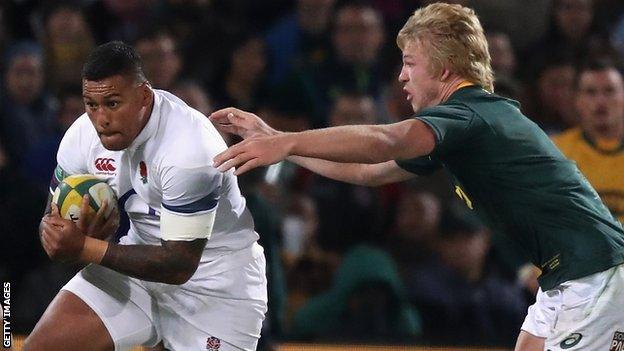Tackle height in rugby union to be lowered in Championship Cup trial
- Published
- comments

Players are currently allowed to tackle from the shoulder line
The height of a legal tackle in rugby union will be lowered next season in a significant trial designed to make the game safer.
The Rugby Football Union's second-tier Championship Cup, external competition will be played under new laws, with the height of a legal tackle below the armpits rather than the line of the shoulders.
It comes after the latest English rugby injury audit revealed a rise in injuries and concussion in the professional game.
It is understood there had been a plan to have the whole of the Championship season played under the new guidelines, but that was not approved by the clubs.
"We believe lowering the height of the tackle will benefit both the ball carrier and the tackler," RFU professional rugby director Nigel Melville said.
"The Championship Cup provides an opportunity for us to assess the impact of lowering the height of the tackle on the elite adult game.
"It will be a critical part of helping us develop game-wide approaches to concussion and injury reduction."
BBC reporter Chris Jones explains new tackle height trial in rugby union
Governing body World Rugby has already started a similar trial,, external with the height of the tackle in the World Rugby Under-20 Trophy moved from "the line of the shoulders to below the nipple line".
"We applaud the RFU and the Championship Cup clubs for embracing this important trial," chairman and former England captain Bill Beaumont said.
"The global game is committed to an evidence-based approach to injury prevention. The outcomes from this trial will provide comprehensive data and feedback to inform our continued commitment to further reducing concussion risk in rugby."
In March, English rugby chiefs produced an eight-point action plan after the annual injury report revealed "significant challenges" for player welfare.
This trial, the first of its kind in the UK, is therefore a response to growing concern about the dangers of rugby union, especially regarding brain injuries and concussion.